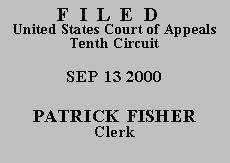

| DANIEL GOMEZ, | No. 00-2222
(D.C. No. CIV-00-763-LH/KBM) |
Respondent Wackenhut Corrections Corporation (Wackenhut) operates the LCCF under a contract with Respondent Lea County, New Mexico. Mr. Gomez alleges that the contract between the New Mexico Corrections Department and Lea County, as well as the contract between Lea County and Wackenhut, violates state law and his constitutional rights to due process, equal protection, and to be free from cruel and unusual punishment. Mr. Gomez also alleges that the terms of the contracts violate his constitutional rights by providing Lea County with an incentive to provide poor conditions and deny Mr. Gomez good time credits. Further, Mr. Gomez alleges that Wackenhut has detained his "class members" past their release dates in an effort to increase profits under the contract. According to Mr. Gomez, Lea County has breached the contracts by failing to ensure proper classification of inmates and failing to provide a sufficient number of properly trained and adequately experienced staff.
In his section 2241 petition, Mr. Gomez raises various additional state law claims. He claims that Respondents violated state law by failing to ensure LCCF met or exceeded corrections department standards. Further, Mr. Gomez claims that the contracts violate state law because Lea County is not in the business of providing correctional jail services as contemplated by state law. Finally, he claims Respondents' conduct constitutes fraud, deceptive trade practices, and a pattern of racketeering, all in violation of state law.
A magistrate judge sua sponte issued an order to show cause why the petition should not be dismissed for failure to exhaust state remedies. In his response, Mr. Gomez claimed that exhaustion was not required because he "has raised claims implicating important state interests." He also contended that the state waived the exhaustion requirement. Finally, Mr. Gomez argued that he would be prejudiced by exhaustion due to undue delay and futility in the state court proceedings. After considering Mr. Gomez's objections, the district court dismissed the petition without prejudice for failure to exhaust. The district court subsequently denied Mr. Gomez's application for a certificate of appealability (COA). This appeal and application for COA followed. We deny Mr. Gomez's application and dismiss his appeal.
A state prisoner may appeal the denial of a section 2241 petition only if "a circuit justice or judge" issues a COA. 28 U.S.C. § 2253(c)(1)(A); Montez v. McKinna, 208 F.3d 862, 867 (10th Cir.2000) (holding that a state prisoner must obtain a COA to appeal the denial of a section 2241 petition). To obtain a COA under section 2253(c), a habeas prisoner must make a "substantial showing of the denial of a constitutional right." § 2253(c)(2). This showing requires a demonstration that reasonable jurists could debate whether the petition should have been resolved in a different manner. Slack v. McDaniel, 120 S.Ct. 1595, 1603-04 (2000). We conclude Mr. Gomez has failed to make the required showing.
First, Mr. Gomez's state law claims are not cognizable in a federal habeas action. See 28 U.S.C. § 2241(c)(3); Montez, 208 F.3d at 865. Further, to the extent Mr. Gomez challenges his transfer per se to a private facility or his placement in the facility pursuant to contract, such a claim is not cognizable under section 2241. See Montez, 208 F.3d at 865-66; accord Rael v. Williams, No. 00-2145, 2000 WL 1051845 (10th Cir. July 31, 2000) (fact that inmate is transferred to, or must reside in, a private prison does not raise a federal constitutional claim).(2) Finally, to the extent Mr. Gomez raises cognizable federal constitutional claims, the district court properly dismissed his petition without prejudice for failure to exhaust. "Before a federal court may grant habeas relief to a state prisoner, the prisoner must exhaust his remedies in state court. In other words, the state prisoner must give the state courts an opportunity to act on his claims before he presents those claims to a federal court in a habeas petition." O'Sullivan v. Boerckel, 526 U.S. 838, 842 (1999); accord Brown v. Shanks, 185 F.3d 1122, 1124 (10th Cir.1999).
Accordingly, We DENY Mr. Gomez's motion for COA and DISMISS his appeal.(3)
ENTERED FOR THE COURT
Stephanie K. Seymour
Chief Judge
*.After examining appellant's brief and the appellate record, this panel has determined unanimously that oral argument would not materially assist the determination of this appeal. See Fed. R. App. P. 34(a)(2) and 10th Cir. R. 34.1(G). The case is therefore submitted without oral argument. This order and judgment is not binding precedent, except under the doctrines of law of the case, res judicata, or collateral estoppel. The court generally disfavors the citation of orders and judgments; nevertheless, an order and judgment may be cited under the terms and conditions of 10th Cir. R. 36.3.
1.Because the 2241 petition in this case is nearly identical to those filed in Keck v. Williams, No. 00-2192, 2000 WL 1089503 (10th Cir. Aug. 4, 2000); Wolf v. Williams, No. 00-2127, 2000 WL 1089501 (10th Cir. Aug. 4, 2000); Ayon v. Williams, No. 00-2161, 2000 WL 1089499 (10th Cir. Aug. 4, 2000); Seifert v. Williams, No. 00-2146, 2000 WL 1089496 (10th Cir. Aug. 4, 2000), our order and judgments in those cases are virtually identical to this one.
2.We note that the district court did not have the benefit of our decision in Rael, which we decided after the district court dismissed the petition.
3.See Hogan v. Zavaras, 93 F.3d 711, 712 (10th Cir. 1996) (denying COA and dismissing appeal of district court's denial of section 2241 petition for failure to exhaust).